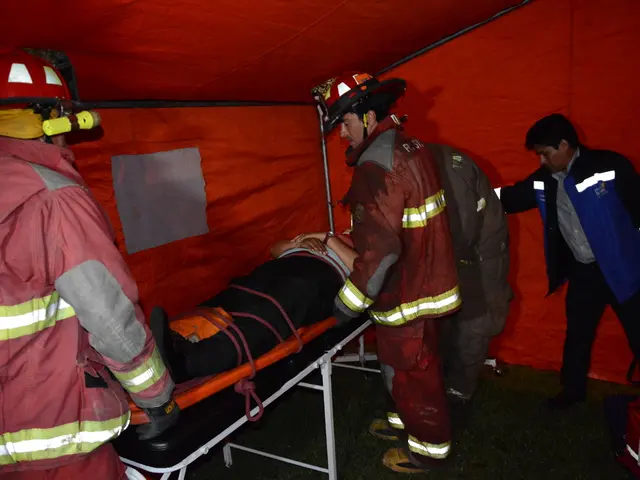Managing Rotator Cuff Injuries Post-45: What Are the Strategies?
For individuals over the age of 45, dealing with rotator cuff injuries requires a strategic approach due to the multifactorial causes and the delicate nature of this musculoskeletal structure.
Age-related degenerative changes in tendons, coupled with increasing or changing loads, commonly contribute to partial or full rotator cuff tears. Traumatic events, such as falls or shoulder dislocations, can also lead to these injuries.
The rotator cuff, a small group of muscles and tendons surrounding the shoulder, is approximately 5 millimeters thick. Consequently, it is vulnerable to damage from seemingly minor incidents, such as slipping on ice. Injuries of this nature often bring about increased pain, prompting individuals to seek medical attention, although they might be sent home with anti-inflammatory medication after about a week without any significant treatment.
It's essential to distinguish between tendonitis, a more common condition, and a torn rotator cuff. Tendonitis results from wear and tear and is characterized by inflammation of the rotator cuff tendon caused by repeated motion. This type of injury usually arises from common yard work activities that involve repetitive motions, such as snow shoveling or leaf raking. A focused, six-month therapy program is often recommended for tendonitis, providing significant relief.
Physicians may order a magnetic resonance imaging (MRI) scan for individuals experiencing persistent pain that hasn't improved after 4 to 6 weeks. By this point, the tear is usually more than 4 to 6 weeks old. Deciding on surgical repair depends on various factors, including the amount of tendon strands torn, their location, and their quality.
Recovering from a rotator cuff injury, whether torn or not, requires patience. While resting the shoulder is necessary, excess idleness can lead to atrophy and loss of mobility. Consider turning to gentle exercises to restore range of motion and build strength, always consulting a healthcare professional first to ensure exercises are appropriate for the individual's condition.
Physiotherapy is integral to non-surgical treatment, aiming to address weakness and tightness associated with rotator cuff tears, as well as improving shoulder movement and strength through exercises tailored to the severity of the tear. Pain management techniques, such as cryotherapy and controlled compression systems, can also facilitate more effective rehabilitation by reducing pain and swelling.
Regularly assessing progress and adjusting treatments as needed is essential, while maintaining proper posture and ergonomics can help reduce strain on the shoulders. Around 73-80% of degenerative tears can improve with non-surgical treatment, making physiotherapy and lifestyle modifications crucial components of the recovery process.
- Aging brings about an increase in health issues, such as chronic diseases like chronic kidney disease, COPD, type-2 diabetes, and cancer, which require a strategic approach to manage.
- Sports enthusiasts may experience respiratory conditions like asthma or COPD, and regular fitness and exercise can help manage these conditions.
- Science plays a crucial role in understanding and addressing digestive health issues, such as irritable bowel syndrome, or eye health problems, like cataracts and macular degeneration.
- Mental health conditions, like depression and anxiety, need to be managed with the help of medical professionals and may involve medication, therapy, and lifestyle changes.
- Nutrition plays a significant role in maintaining health and wellness, particularly in managing conditions like diabetes, helping prevent chronic diseases, and supporting the body's overall function.
- Hearing loss, a common issue with aging, can be managed through the use of hearing aids or cochlear implants, while regular hearing tests help detect issues early.
- Neurological disorders, like multiple sclerosis, Alzheimer's disease, migraines, and neurological-related conditions, require specialized medical treatment and management.
- Autoimmune disorders, such as rheumatoid arthritis and psoriasis, can cause symptoms like joint pain, swelling, and skin conditions, and may require medications, dietary modifications, and lifestyle changes.
- Cardiovascular health is crucial for preventing heart disease and stroke, with diet, exercise, and regular check-ups being key components of maintaining heart health.
- Skin conditions, like eczema and psoriasis, may require topical treatments, medications, or light therapy to manage.
- In older adults, degenerative changes in tendons can lead to chronic conditions like rotator cuff injuries, which may require medical treatment, physical therapy, and lifestyle modifications for recovery.
- Maintaining good hearing, eye health, and skin conditions is essential for maintaining overall health and wellness as one ages.
- Aging can also bring about conditions like osteoarthritis, which may require medications, surgery, or lifestyle modifications for management.
- Regular check-ups with healthcare professionals, a balanced diet, regular exercise, and proper self-care, like wearing sunscreen and sunglasses, are essential components of maintaining health and wellness throughout one's life.








